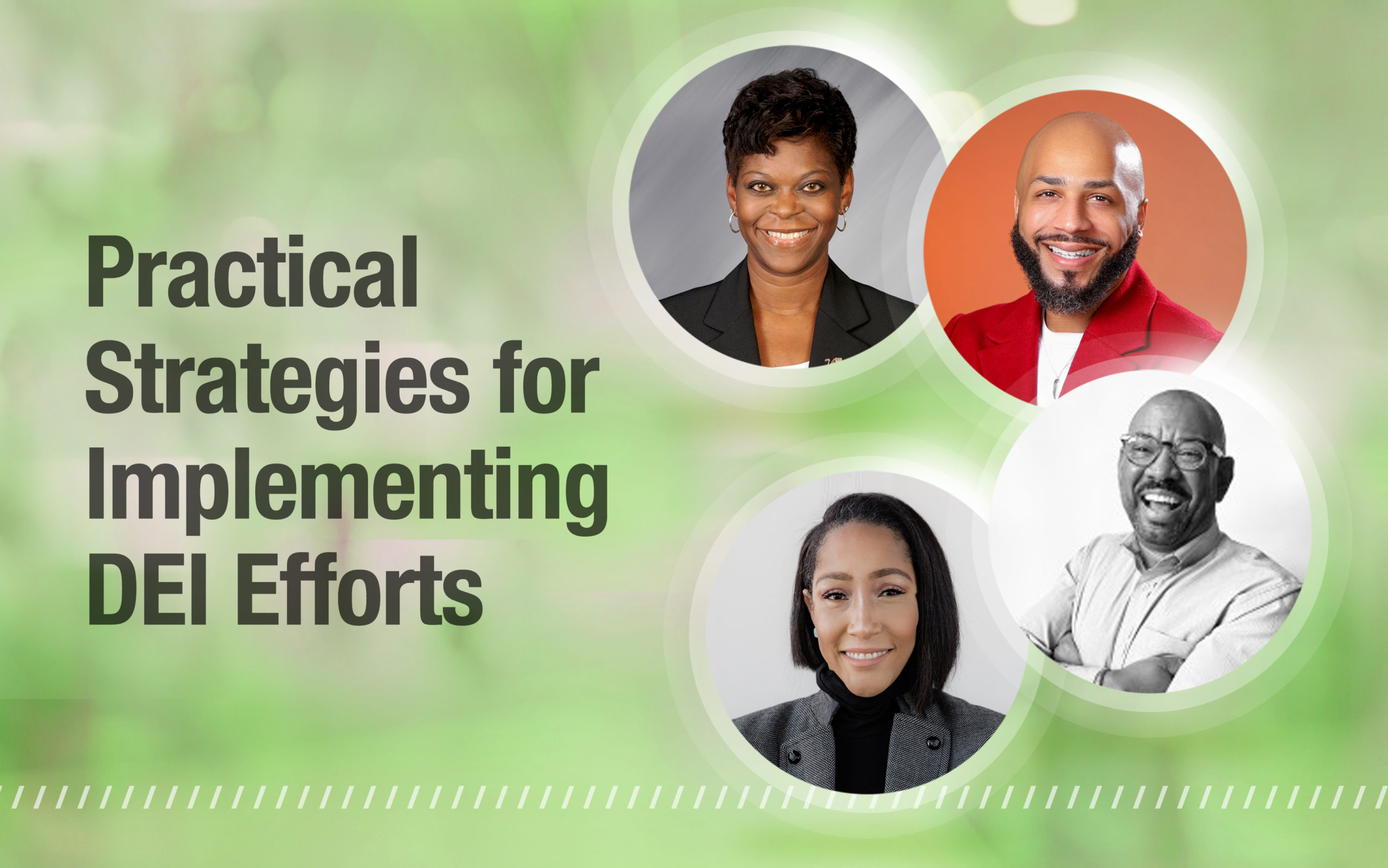Addressing Diversity, Equity, and Inclusion for Meetings & Events
Key Takeaways:
- Conversations about diversity, equity, and inclusion don’t have to be tense. How can you make it fun? When people feel welcomed, they feel included and are more likely to contribute their voice to solutions.
- It’s OK to take small steps to start with, but communicate those so people know you are taking action.
- As in-person events restart and the industry begins rehiring, it will present an opportune moment to look at the workforce and hire for diversity.
- Events should have a DEI plan and all staff should have buy-in and input.
Does every event need a DEI plan? Who should champion these efforts? How do I make sure my company follows through?
Those questions and more were addressed during a recent ELI webinar on diversity, equity, and inclusion—known collectively as DEI—with Brandi Carson, co-owner of Houston-based Posh & Private Event Design; Devin Lewis CEM, CMP, director of regional sales at Las Vegas Convention and Visitors Authority and based in Washington, D.C.; Steve M. Moore, sales account manager at Affairs to Remember in Atlanta; and Antwone Stigall, CMP, chief event officer at Antwone Stigall & Co. in San Francisco.
Stigall suggested tapping someone to lead DEI efforts and advocate for initiatives with senior management, but “at the end of the day, it’s everyone’s responsibility to say something, do something, join a program.” Your mindset will make a difference, he added. “In my opinion, DEI is fun! You get to meet so many different people. You get to learn different stories, hear different experiences, and find out how we can create together and cohabitate. It doesn’t have to be tense.”
Some people automatically associate DEI with racism, Moore said. That’s the wrong way to begin the discussion. “Those are two totally different things,” Moore said. “So many people are like, ‘I don’t want to have this conversation.’ Get past that initial racism part and understand what diversity is.”
When setting DEI goals, Moore advised choosing things that are meaningful to your organization because people will be able to tell if the effort isn’t sincere. Then check on the progress each month or quarter and then annually. Internal DEI goals can measure recruitment and hiring, retention, salaries, promotions, and more. Look at how your organization presents itself to the world. Whose faces does your social media or website show?
“Representation matters,” Carson said. “If I can’t see myself, then I can’t see myself spending money with you at your venue.”
Smaller steps are OK and can lead to larger progress, Stigall said. “You want to be transparent about those baby steps and document that and tell your membership and teams so they have some line of sight into what you’re doing. If you’re taking baby steps, they might not see those and think there is no motion. Let people know what you’re doing and invite them to volunteer.”
When planning meetings and events, consider creating a DEI plan. Some points to consider include:
- What are you doing to ensure that speakers reflect the group’s diversity?
- Do marketing materials show a variety of people?
- Aask guests what their needs are through responsive surveys that begin with “Can we accommodate you further?” Then follow with a host of questions on food, travel accessibility, venue accessibility, and more. Give attendees the option to call you if they have more to share.
- Check whether a venue’s preferred vendor list includes minority-owned businesses.
- Venue operators can give their sales staff bias training so all types of groups have access to venues and feel welcome.
“When people feel welcome, when they feel included, they are more likely to lend their voices to an issue or a topic,” Lewis said. “When they feel they may be judged or ostracized or looked at in a certain way, that’s when you have less diverse panels and groups.”
Moore broke ground as the first Black salesperson for one of Atlanta’s major catering companies. While he—and his colleagues—recognized the achievement, he did not want to feel pigeonholed. “I was the Black wedding caterer. If you had a Black client, I got that. I had to step back and say, hey, money is green and I do it all.”
As the industry moves out of the COVID-19 pandemic and begins rehiring furloughed or laid off event professionals—as well as welcoming new graduates to the industry—companies will have a chance to consider the diversity of their workforce.
“I would hope that companies and organizations take this opportunity to rethink and reassess the makeup of their teams,” Lewis said. “If you have sameness, whether that’s sameness in color or gender, the thoughts are the same. … If your team is diverse and people feel safe to say what they feel, it’s only going to benefit the organization and your team as a whole.”
What if your company has great DEI policies in place but no one follows them? “Then they’re not great! Simply put, they’re not great,” Stigall said. “That is an example to me of poor leadership. … These are the policies for a reason. Let’s make sure they’re being enforced so we have the best company culture possible.”
Read more: ‘A Long Way to Go’: Event Industry Leaders Reflect on Diversity, Opportunities, and Challenges
Watch and listen to the entire panel conversation for more takeaways about the role of DEI at organizations and events.


